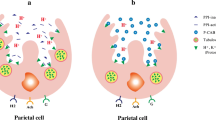Abstract
Goals of work
Inoperable bowel obstructions are not uncommon in advanced cancer and are associated with a very poor prognosis. Symptom control includes reducing the frequency of vomiting by prescription of antisecretory medications. The most commonly used agents for this are either hyoscine butylbromide or octreotide. Either histamine 2 antagonists or proton pump inhibitors are sometimes recommended as adjuvants to reduce gastric secretions. The aim of this study was to examine the effects of histamine 2 antagonists and proton pump inhibitors and to objectively compare the effects of one agent over another.
Materials and methods
Previously, electronic databases were searched for trials that compared ranitidine versus proton pump inhibitors in their effect on volume of gastric aspirates.
Results
Seven trials were included in a meta-analysis. Pooled outcomes suggest that both proton pump inhibitors and ranitidine reduce gastric volumes, but the most superior agent is ranitidine, which reduces the volume of gastric secretions by an average of 0.22 ml.kg−1; 95% confidence interval 0.04 to 0.41.
Conclusions
Based on well-conducted studies, objective evidence exists that confirms ranitidine will decrease the volume of gastric aspirates. This forms a sound basis from which to develop further research aimed at improving the care of people with malignant bowel obstructions.

Similar content being viewed by others
References
Feuer DJ, Broadley KE, Shepherd JH, Barton DP (2000) Surgery for the resolution of symptoms in malignant bowel obstruction in advanced gynaecological and gastrointestinal cancer. Cochrane Database Syst Rev (4):CD002764
Pameijer CR, Mahvi DM, Stewart JA, Weber SM (2005) Bowel obstruction in patients with metastatic cancer: does intervention influence outcome? Int J Gastrointest Cancer 35(2):127–133. doi:10.1385/IJGC:35:2:127
Ripamonti C, Bruera E (2002) Palliative management of malignant bowel obstruction. Int J Gynecol Cancer 12(2):135–143. doi:10.1046/j.1525-1438.2002.01103.x
Australian Therapeutic Guidelines Palliative Care 2nd ed. Melbourne, Australia: Therapeutic Guidelines Limited; 2005
Ouellette J, Patterson L, P. T. Fast Fact and Concept #091: Interventional Options for Malignant Upper GI Obstruction. American Academy of Hospice and Palliative Care, (www.epercmcw.edu), 2007.
Clark K, Lam L, Gibson S, Currow D (2009) The effect of ranitidine versus proton pump inhibitors on gastric secretions: a meta-analysis of randomised control trials. Anaesthesia (in press).
Jadad AR, Moore RA, Carroll D, Jenkinson C, Reynolds DJ, Gavaghan DJ et al (1996) Assessing the quality of reports of randomized clinical trials: is blinding necessary? Control Clin Trials 17(1):1–12. doi:10.1016/0197-2456(95) 00134-4
Begg CB (1994) Publication Bias. Russell Sage Foundation, New York City
Egger M, Davey Smith G, Schneider M, Minder C (1997) Bias in meta-analysis detected by a simple, graphical test. BMJ 315(7109):629–634
Australian Therapeutic Guidelines Gastrointestinal 1st ed. Melbourne, Australia: Therapeutic Guidelines Limited; 2008
Krouse RS (2007) The international conference on malignant bowel obstruction: a meeting of the minds to advance palliative care research. J Pain Symptom Manage 34(1 Suppl):S1–S6. doi:10.1016/j.jpainsymman.2007.04.005
Anthony T, Baron T, Mercadante S, Green S, Chi D, Cunningham J et al (2007) Report of the clinical protocol committee: development of randomized trials for malignant bowel obstruction. J Pain Symptom Manage 34(1 Suppl):S49–S59. doi:10.1016/j.jpainsymman.2007.04.011
Ripamonti CI, Easson AM, Gerdes H (2008) Management of malignant bowel obstruction. Eur J Cancer 44(8):1105–1115. doi:10.1016/j.ejca.2008.02.028
Ripamonti C, Twycross R, Baines M, Bozzetti F, Capri S, De Conno F et al (2001) Clinical-practice recommendations for the management of bowel obstruction in patients with end-stage cancer. Support Care Cancer 9(4):223–233. doi:10.1007/s005200000198
Salem MR, Wong AY, Mani M, Bennett EJ, Toyama T (1976) Premedicant drugs and gastric juice pH and volume in paediatric patients. Anesthesiology 44(3):216–219. doi:10.1097/00000542-197603000-00010
Hatlebakk JG, Berstad A (1996) Gastro-oesophageal reflux during 3 months of therapy with ranitidine in reflux oesophagitis. Scand J Gastroenterol 31(10):954–958. doi:10.3109/00365529609003113
Pisegna JR (2001) Switching between intravenous and oral pantoprazole. J Clin Gastroenterol 32(1):27–32. doi:10.1097/00004836-200101000-00007
Miller R (1984) Pharmacokinetics and bioavailability of ranitidine in humans. J Pharm Sci 73(10):1376–1379. doi:10.1002/jps.2600731013
Agar M, Webster R, Lacey J, Donovan B, Walker A (2004) The use of subcutaneous omeprazole in the treatment of dyspepsia in palliative care patients. J Pain Symptom Manage 28(6):529–531. doi:10.1016/j.jpainsymman.2004.10.005
Davis MP, Furste A (1999) Glycopyrrolate: a useful drug in the palliation of mechanical bowel obstruction. J Pain Symptom Manage 18(3):153–154. doi:10.1016/S0885-3924(99) 00063-9
Escolano F, Castano J, Lopez R, Bisbe E, Alcon A (1992) Effects of omeprazole, ranitidine, famotidine and placebo on gastric secretion in patients undergoing elective surgery. Br J Anaesth 69(4):404–406. doi:10.1093/bja/69.4.404
Hendolin H, Suojaranta-Ylinen R, Alhava E (1993) Effect of single-dose omeprazole and ranitidine on gastric juice acidity and volume in patients undergoing laparotomy. Acta Anaesthesiol Scand 37(5):484–487. doi:10.1111/j.1399-6576.1993.tb03751.x
Nishina K, Mikawa K, Maekawa N, Takao Y, Shiga M, Obara H (1996) A comparison of lansoprazole, omeprazole, and ranitidine for reducing preoperative gastric secretion in adult patients undergoing elective surgery. Anesth Analg 82(4):832–836. doi:10.1097/00000539-199604000-00027
Nishina K, Mikawa K, Takao Y, Shiga M, Maekawa N, Obara H (2000) A comparison of rabeprazole, lansoprazole, and ranitidine for improving preoperative gastric fluid property in adults undergoing elective surgery. Anesth Analg 90(3):717–721. doi:10.1097/00000539-200003000-00038
Uesugi T, Mikawa K, Nishina K, Morikawa O, Takao Y, Obara H (2002) The efficacy of lafutidine in improving preoperative gastric fluid property: a comparison with ranitidine and rabeprazole. Anesth Analg 95(1):144–147
Memis D, Turan A, Karamanlioglu B, Saral P, Ture M, Pamukcu Z (2003) The effect of intravenous pantoprazole and ranitidine for improving preoperative gastric fluid properties in adults undergoing elective surgery. Anesth Analg 97(5):1360–1363
Goel C, Anand LK, Gombar K (2006) Comparative evaluation of single dose intravenous pantoprazole and ranitidine on gastric pH and volume: a double-blind study. J Anaesthesiol Clin Pharmacol 22(2):145–9
Author information
Authors and Affiliations
Corresponding author
Rights and permissions
About this article
Cite this article
Clark, K., Lam, L. & Currow, D. Reducing gastric secretions—a role for histamine 2 antagonists or proton pump inhibitors in malignant bowel obstruction?. Support Care Cancer 17, 1463–1468 (2009). https://doi.org/10.1007/s00520-009-0609-3
Received:
Accepted:
Published:
Issue Date:
DOI: https://doi.org/10.1007/s00520-009-0609-3




